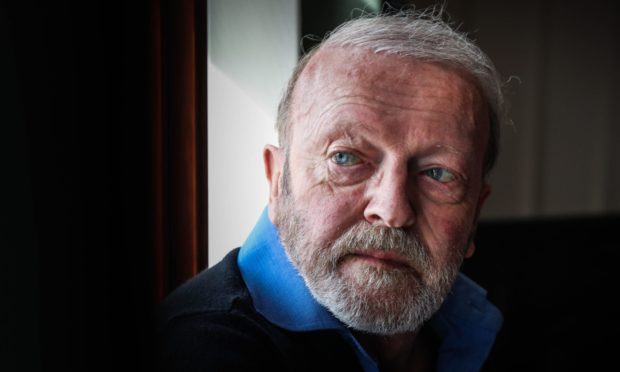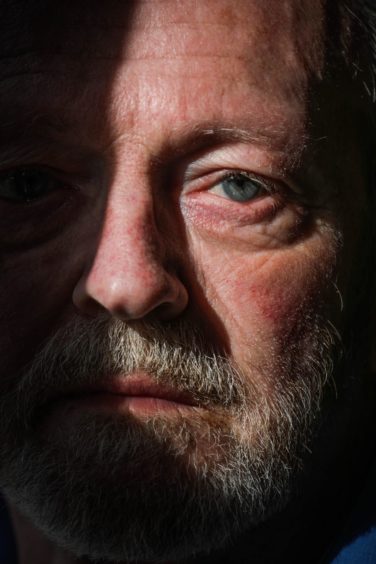A terminally ill Dundee man says securing the right to die changed his life and believes all Scots should be afforded the same dignity in death.
Dave Finlayson, 71, who has motor neuron disease (MND), is resigned to the fact he only has a few years left to live.
Despite this, he says he feels free.
Two years ago, he arranged what he calls an “escape route” meaning he can end his life whenever he chooses at an assisted suicide clinic in Switzerland.
“Why should anyone need to suffer?” he says.
“We don’t allow an animal to suffer. God, they have a better deal than we have.”
Law change
Assisted dying is illegal in Scotland and the rest of the UK but proposed new laws will likely come before MSPs after the election.
It will be the third attempt after previous votes were defeated in 2010 and 2015.
Dave says Scotland must catch up with the growing number of countries to have passed laws legalising forms of euthanasia.
The most recent is New Zealand where residents were asked in a world-first euthanasia referendum in November 2020.
Black Watch veteran Dave’s incurable condition means he is slowly losing strength in his muscles. His biggest fear is ending up completely paralysed but still conscious.
Life expectancy of someone with MND after diagnosis is one to five years, with 10 per cent of people living 10 years or more.
Dave, a former heating surveyor, was diagnosed in 2015 but his health has not deteriorated as much as he expected.
Remarkably, he remains mobile enough to walk up the Hilltown — one of Dundee’s steepest streets.
The former Logie School pupil also regularly swims at Dundee’s Olympia Leisure Centre.
But he knows this could change at any point and is essentially playing a waiting game.
Switzerland an ‘escape route’
When he feels his condition may soon prevent him from travelling, Dave says he will step on to a flight to Switzerland with the help of Dignitas to end his life by drinking a small dose of a lethal drug.
The divorced dad-of-two has already paid £3000 for the privilege with the total cost expected to be around £10,000.
“If the law changed here I would wait until I was in a bad way,” he said.
“As it stands, I will need to go to Switzerland earlier than I would like so I’m well enough to travel.
“Thank God for Switzerland.”
He added: “I’m glad I’ve got this in place. No matter what lies in front of me, I’ve got this escape route, for want of a better word.
“I was very concerned about not having everything in place and that was continually on my mind.
“When I got the green light, mentally, that was life changing.”
Number of Brits choosing assisted death unknown
There are thousands of others with a terminal illness across the country and it’s believed more and more people are travelling abroad to die at clinics.
UK health secretary Matt Hancock has requested figures from the UK’s chief statistician detailing exactly how many.
Arguments against assisted dying include whether such permissions send society down a slippery slope, potentially leading to vulnerable people being pressured.
Some also claim adequate end-of-life care should mean assisted suicide is unnecessary.
A religious argument is also often made that those dying deserve special care and protection.
Despite attempts to change the law failing in the past, the public appears to be supportive.
The British Medical Association (BMA), the UK’s leading trade union for doctors, found shifting attitudes among medical workers.
‘Lessons learned’ from failed efforts
Tayside campaigner Moira Symons cared for her mother for five years but watched her suffer and was unable to fulfil her wish to speed up her death.
Ms Symons, a trustee and Tayside group coordinator at Friends at the End, says she’s never been more confident change is on the horizon.
“I am extremely confident that an assisted dying law will get across the line during the life of the new parliament,” she says.
“Lessons will have been learned from the first two attempts, so that the third one will be the right law for Scotland.”
Ally Thomson, director of Dignity in Dying Scotland, says the current law is “not working.”
She said: “Dave’s experience shows that we need a new law that allows dying people to die with dignity here in Scotland.”
Dr Gordon Macdonald, chief executive of Care Not Killing, says the most vulnerable in society must be protected and said no new laws allowing assisted suicide should be introduced.
He said: “It is disappointing that in the midst of the COVID pandemic, which has seen discrimination against the elderly and disabled people, that there is another push to legalise assisted suicide and euthanasia.
“Our current laws protect the most vulnerable in our society, the elderly, the sick and disabled from feeling pressured into ending their lives, exactly as we see in the handful of places around the world that allow assisted suicide or euthanasia.
“Indeed, in the US State of Oregon, six in ten (59 per cent) of those ending their lives in 2019 cited the fear of being a burden on their families as a reason and further 7.4 per cent cited financial worries.”
He also claimed legalising assisted suicide in parts of the USA appears to have contributed to a rise suicide rates in the general population.
For emotional support you can call the Samaritans 24-hour helpline on 116 123, email jo@samaritans.org, visit a Samaritans branch in person or go to the Samaritans website.

